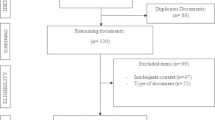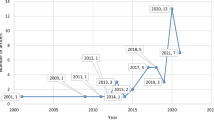Abstract
In recent years, the advent of low-cost digital and mobile devices has led to a strong expansion of social interventions, including those that try to improve student learning and literacy outcomes. Many of these are focused on improving reading in low-income countries, and particularly among the most disadvantaged. Some of these early efforts have been called successful, but little credible evidence exists for those claims. Drawing on a robust sample of projects in the domain of mobiles for literacy, this article introduces a design solution framework that combines intervention purposes with devices, end users, and local contexts. In combination with a suggested set of purpose-driven methods for monitoring and evaluation, this new framework provides useful parameters for measuring effectiveness in the domain of mobiles for literacy.



Similar content being viewed by others
References
All Children Reading (2011). Project website. http://allchildrenreading.org.
August, D., & Shanahan, T. (Eds.) (2006). Developing literacy in second language learners: Report of the National Reading Panel on Language Minority and Youth. Mahwah, NJ: Lawrence Erlbaum Associates.
BBC Janala (2013). Project website. http://www.bbc.co.uk/mediaaction/where_we_work/asia/bangladesh/bbcjanala.html.
Braun, H., & Kanjee, A. (2006). Using assessment to improve education in developing nations. In J. E. Cohen, D. E. Bloom, & M. Malin (Eds.), Improving education through assessment, innovation, and evaluation (pp. 1–46). Cambridge, MA: American Academy of Arts and Sciences.
Brookings Center for Universal Education (2011). A global compact on learning: Taking action on education in developing countries. Washington, DC: Brookings.
Cristia, J. P., Ibarrarán, P., Cueto, S., Santiago, A., & Severín, E. (2012). Technology and child development: Evidence from the One Laptop per Child Program. IDB working paper IDB-WP-304. Washington, DC: Inter-American Development Bank.
Cuendet, S., Medhi, I., Bali, K., & Cutrell, E. (2013). VideoKheti: Making video content accessible to low-literate and novice users. Paper presented at CHI 2013, April 27–May 2, 2013, Paris. http://research.microsoft.com/pubs/183489/Cuendet-CHI2013-VideoKheti-Final.pdf.
DeBoer, J. (2009). The relationship between environmental factors and usage behaviors at ‘Hole-in-the-wall’ computers. International Journal of Educational Development, 29(1), 91–98. doi:10.1016/j.ijedudev.2008.02.005.
Dodson, L., Sterling, S. R., & Bennett, J. R. (2012). Considering failure: Eight years of ITID research. Information Technology and International Development, 9(2), 19–34.
EDC [Education Development Center] (2011). PHARE project. http://idd.edc.org/projects/mali-usaidphare-program-programme-harmonis%C3%A9-dappui-au-renforcement-de-leducation.
EDC [Educational Development Center] (2011–12). eEGRA: Usable reading results—Right now! http://eegra.edc.org/.
Gove, A., & Cvelich, P. (2010). Early reading: Igniting education for all. A report by the Early Grade Learning Community of Practice. Research Triangle Park, NC: Research Triangle Institute. http://www.uis.unesco.org/Education/Documents/early-reading-report_gove_cvelich.pdf.
Gray, W. S. (1956). The teaching of reading and writing. Paris: UNESCO.
Hinostroza, J. E., Isaacs, S., & Bougroum, M. (2012). Information and communications technologies for improving students’ learning opportunities and outcomes in developing countries. Draft report. Washington, DC: Brookings GCL.
HIWEL [Hole in the Wall Education Limited] (2013). Project website: http://www.hole-in-the-wall.com.
ITU [International Telecommunications Union] (2009). Information statistical profiles 2009: Africa. Geneva: ITU.
Jack, W., & Suri, T. (2010). The economics of M-Pesa. Nairobi: Central Bank of Kenya. http://www.mit.edu/~tavneet/M-PESA.pdf.
Koole, M., McQuilkin, J. L., & Ally, M. (2010). Mobile learning in distance education: Utility or futility? Journal of Distance Education, 24, 59–82.
Leu, D. J., O’Byrne, W. I., Zawilinski, L., McVerry, J. G., & Everett-Cacopardo, H. (2009). Expanding the new literacies conversation. Educational Researcher, 38(4), 264–269.
Levy, F., & Murnane, R. J. (2004). Education and the changing job market. Educational Leadership, 62(2), 80–83.
Mendoza, D., & Vergel de Dios, B. (2012). The pink phone revolution in Cambodia: A case study. Phnom Penh: OXFAM.
Miguel, E., & Kremer, M. (2004). Worms: Identifying impacts on education and health in the presence of treatment externalities. Econometrica, 72(1), 159–217.
Molteno (2013). Organizational website. http://www.molteno.co.za/our-programmes.
Nugroho, D., & Lonsdale, M. (2010). Evaluation of OLPC programs globally: A literature review. Version 4. Canberra: Australian Council for Education Research.
OECD (2013). Aid to poor countries slips further as governments tighten budgets. OECD Newsroom. http://www.oecd.org/newsroom/aidtopoorcountriesslipsfurtherasgovernmentstightenbudgets.htm.
OLPC [One Laptop per Child] (2013). Project website: http://one.laptop.org/.
Pachler, N., Cook, J., & Bachmair, B. (2010). Appropriation of mobile cultural resources for learning. International Journal of Mobile and Blended Learning, 2, 1–21.
Paiwastoon (2013). Project website. http://svr1.paiwastoon.net/mliteracy/.
RTI [Research Triangle Institute] International (2011). Tangerine project website. http://www.tangerinecentral.org/node/973.
Stewart, A. (2013). “M” is for mobile: Sesame Workshop’s mobile initiatives in India. Presentation at Connected Living Asia Summit mEducation, Shanghai, 25 June. http://www.gsma.com/connectedliving/wp-content/uploads/2013/03/MAE-Connected-Living-Summit_Sesame.pdf.
Street, B. V. (1999). The meanings of literacy. In D. A. Wagner, R. L. Venezky, & B. V. Street (Eds.), Literacy: An international handbook (pp. 34–40). Boulder, CO: Westview Press.
Streitfeld, D. (2013, April 8). Teacher knows if you’ve done the e-reading. The New York Times. http://www.nytimes.com/2013/04/09/technology/coursesmart-e-textbooks-track-students-progress-for-teachers.html?pagewanted=all.
Tolani-Brown, N., McCormac, M., & Zimmermann, R. (2009). An analysis of the research and impact of ICT in education in developing country contexts. Journal of Education for International Development, 4(2), 1–12.
Terras, M. M., & Ramsey, J. (2012). The five central psychological challenges facing effective mobile learning. British Journal of Educational Technology, 43, 820–832.
Traxler, J. (2009). Learning in a mobile age. International Journal of Mobile and Blended Learning, 1, 1–12.
UNESCO (2012). Education for All global monitoring report. Youth and skills: Putting education to work. Paris: UNESCO.
UNESCO (2013). UNESCO policy guidelines for mobile learning. Paris: UNESCO. http://unesdoc.unesco.org/images/0021/002196/219641e.pdf.
USAID (2012). USAID education strategy: Implementation guidance. Washington, DC: USAID. http://pdf.usaid.gov/pdf_docs/pdact461.pdf.
USNRP [United States National Reading Panel] (2000). Teaching children to read: An evidence-based assessment of the scientific research literature on reading and its implications for reading instruction. NIH Pub. No. 00-4769. Washington, DC: National Institutes of Health.
Wagner, D. A. (2005). Pro-equity approaches to monitoring and evaluation: Gender, marginalized groups and special needs populations. In D. A. Wagner (Ed.), Monitoring and evaluation of ICT in education projects: A handbook for developing countries (pp. 55–64). Washington, DC: World Bank/InfoDev.
Wagner, D. A. (2011). Smaller, quicker, cheaper: Improving learning assessments in developing countries. Washington, Paris: EFA Fast Track Initiative and UNESCO IIEP.
Wagner, D. A. (2013a). Literacy and mobiles in poor populations: What Do We Call ‘Success’? Plenary address. UNESCO Mobile Learning Week. Paris: UNESCO.
Wagner, D. A. (2013b). M4R: A landscape research review of mobiles for reading. Draft technical report. Philadelphia: University of Pennsylvania.
Wagner, D. A., Day, R., James, T., Kozma, R. B., Miller, J., & Unwin, T. (2005). Monitoring and evaluation of ICT in education projects: A handbook for developing countries. Washington, DC: World Bank/InfoDev. http://www.infodev.org/en/Document.9.pdf.
Wagner, D. A., Murphy, K. M., & de Korne, H. (2012). Learning first: A research agenda for improving learning in low-income countries. Washington, DC: Brookings Institution.
Wagner, D. A., Venezky, R. L., & Street, B. V. (Eds.) (1999). Literacy: An international handbook. Boulder, CO: Westview Press.
WITSA [World Information Technology and Services Alliance] (2010). The digital planet (2010 edition). http://www.witsa.org/dplanet/DP2010Presentation.pdf.
Worldreader (2014). Organizational website. http://www.worldreader.org/.
Worldreader, ILC Africa, & USAID (2012). IRead Ghana Study: Final evaluation report. Washington, DC: USAID.
Yardley, H. (2011). International Women’s Day: Cambodia’s pink tech revolution. Oxfam Southern Africa Blog. http://www.oxfamblogs.org/southernafrica/?p=2246#sthash.Ip6bbFzf.dpuf.
Yoza Project (2009–2013). Project website. http://yozaproject.com/about-the-project/.
Author information
Authors and Affiliations
Corresponding author
About this article
Cite this article
Wagner, D.A., Castillo, N.M., Murphy, K.M. et al. Mobiles for literacy in developing countries: An effectiveness framework. Prospects 44, 119–132 (2014). https://doi.org/10.1007/s11125-014-9298-x
Published:
Issue Date:
DOI: https://doi.org/10.1007/s11125-014-9298-x




